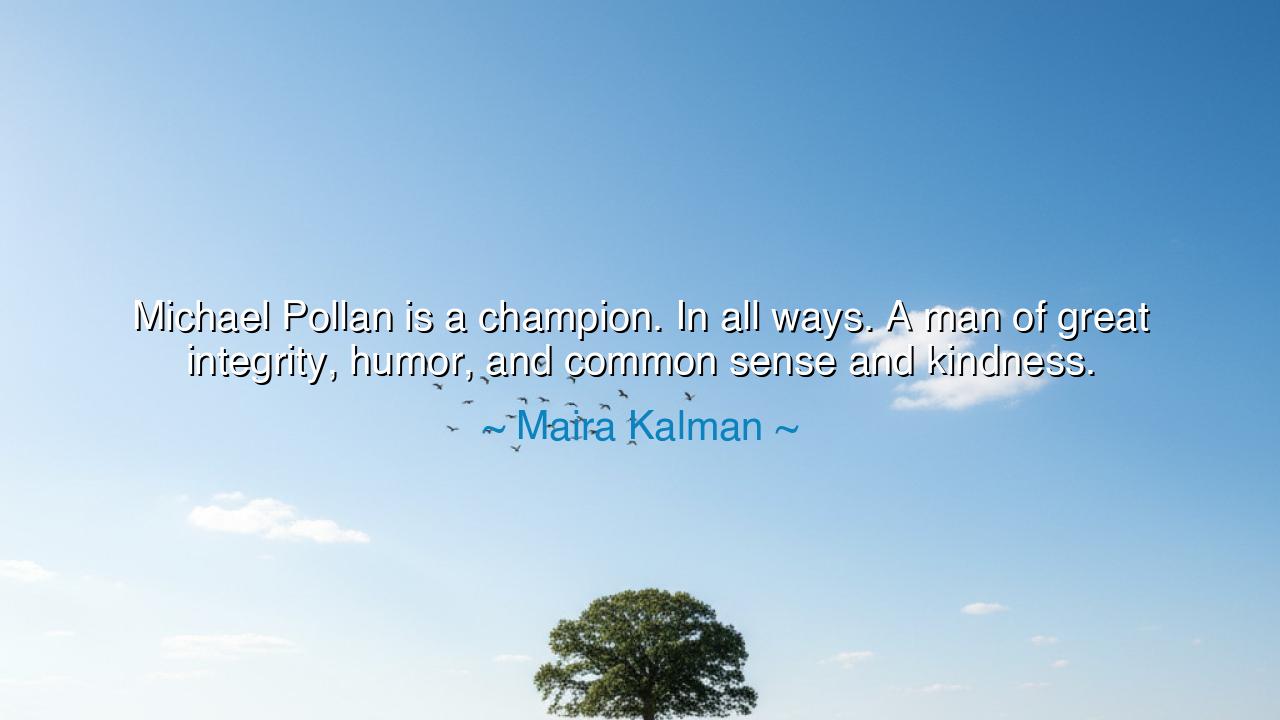
Michael Pollan is a champion. In all ways. A man of great
Michael Pollan is a champion. In all ways. A man of great integrity, humor, and common sense and kindness.






The words of Maira Kalman are as luminous as they are sincere: “Michael Pollan is a champion. In all ways. A man of great integrity, humor, and common sense and kindness.” In this brief yet powerful tribute, she speaks not merely of one man, but of the qualities that define true greatness. The ancients would have called such a person kalos kagathos — noble in both spirit and deed. Through her praise, Kalman reminds us that heroism is not found in grand gestures or fame, but in the union of wisdom, compassion, and authenticity. Her words honor Pollan, but they also call upon each of us to cultivate those same virtues in the theater of our own lives.
To call someone a champion, as Kalman does, is to recognize a person who fights not for conquest but for truth. Michael Pollan, known for his writings on food, nature, and the human relationship to the earth, has indeed been a champion of consciousness — urging us to eat thoughtfully, to live mindfully, to question the habits that disconnect us from the natural world. Yet what makes him extraordinary is not simply his intellect, but his integrity — the harmony between his words and his actions. In the ancient world, integrity was considered the foundation of all virtue. The Roman philosopher Cicero wrote that “nothing is more becoming to a man than constancy of character.” Pollan, through his steady voice and honest reflection, exemplifies this constancy: a life lived according to principle, not popularity.
But Kalman’s praise does not end with virtue alone. She honors humor, the light that keeps wisdom from becoming arrogance. Humor, in its truest form, is a sign of perspective — the ability to see oneself as part of the grand and imperfect human story. It is humility wrapped in laughter, clarity expressed through play. The ancients told of Diogenes, the philosopher who mocked kings and questioned conventions, using wit as his sword against hypocrisy. Like him, Pollan uses humor not to wound, but to awaken — to remind us that even in the most serious matters, joy and laughter have a place. For truth spoken with a smile often travels farther than truth spoken in scorn.
Then Kalman speaks of common sense, that rare and enduring wisdom that lies not in intellectual complexity but in clarity of heart. The Greeks called it phronesis — practical wisdom, the art of knowing how to live rightly in daily life. Michael Pollan’s teachings are rooted in this principle: eat what is real, cherish what is simple, honor the balance between humanity and nature. In an age overwhelmed by confusion and excess, common sense becomes a form of enlightenment. It is the ability to cut through illusion and remember what has always been true. A person with common sense does not need to shout; their truth resonates quietly, like a bell struck in still air.
But the greatest of all these virtues — and the one Kalman leaves for last — is kindness. For without kindness, integrity grows cold, humor turns cruel, and common sense becomes mere pragmatism. Kindness is the soul of humanity. It is the force that heals, unites, and redeems. The Buddha once said, “A single act of kindness casts roots in all directions.” To be kind is not weakness; it is the strength to meet the world with compassion even when it wounds you. Michael Pollan’s kindness, as Kalman describes it, is not sentimental but powerful — the quiet mercy of one who understands that to teach is also to care, and to lead is also to listen.
In her praise, Maira Kalman offers more than admiration — she gives us a model for living. A champion, in her view, is not one who dominates, but one who uplifts. To be a person of integrity is to act with honesty even when unseen. To keep humor is to hold joy amid uncertainty. To use common sense is to live close to truth and nature. And to practice kindness is to make life more gentle for others. These are not traits reserved for philosophers or prophets; they are choices available to all. Each day we can decide whether to be careless or compassionate, cynical or sincere.
And so, dear listener, take Kalman’s words as a quiet summons. Be a champion — not in battle, but in benevolence. Live with integrity, so that your actions are the reflection of your heart. Keep humor, so that your spirit remains light even under burden. Honor common sense, so that your choices serve life rather than ego. And above all, practice kindness, for it is the thread that weaves all virtue into unity. As Maira Kalman teaches through her tribute to Michael Pollan, the measure of greatness is not in what we achieve, but in how we live — with honesty, laughter, wisdom, and love. These, and not power, are the qualities that endure beyond time.






AAdministratorAdministrator
Welcome, honored guests. Please leave a comment, we will respond soon